Evaluating the Contemporary Tourism: Factors and Impacts Analysis
VerifiedAdded on 2023/06/09
|7
|2273
|451
Essay
AI Summary
This essay provides a comprehensive overview of contemporary tourism, highlighting the significant factors driving its development, such as globalization, urbanization, and technological advancements. It delves into the positive and negative economic impacts, including job creation, foreign exchan...
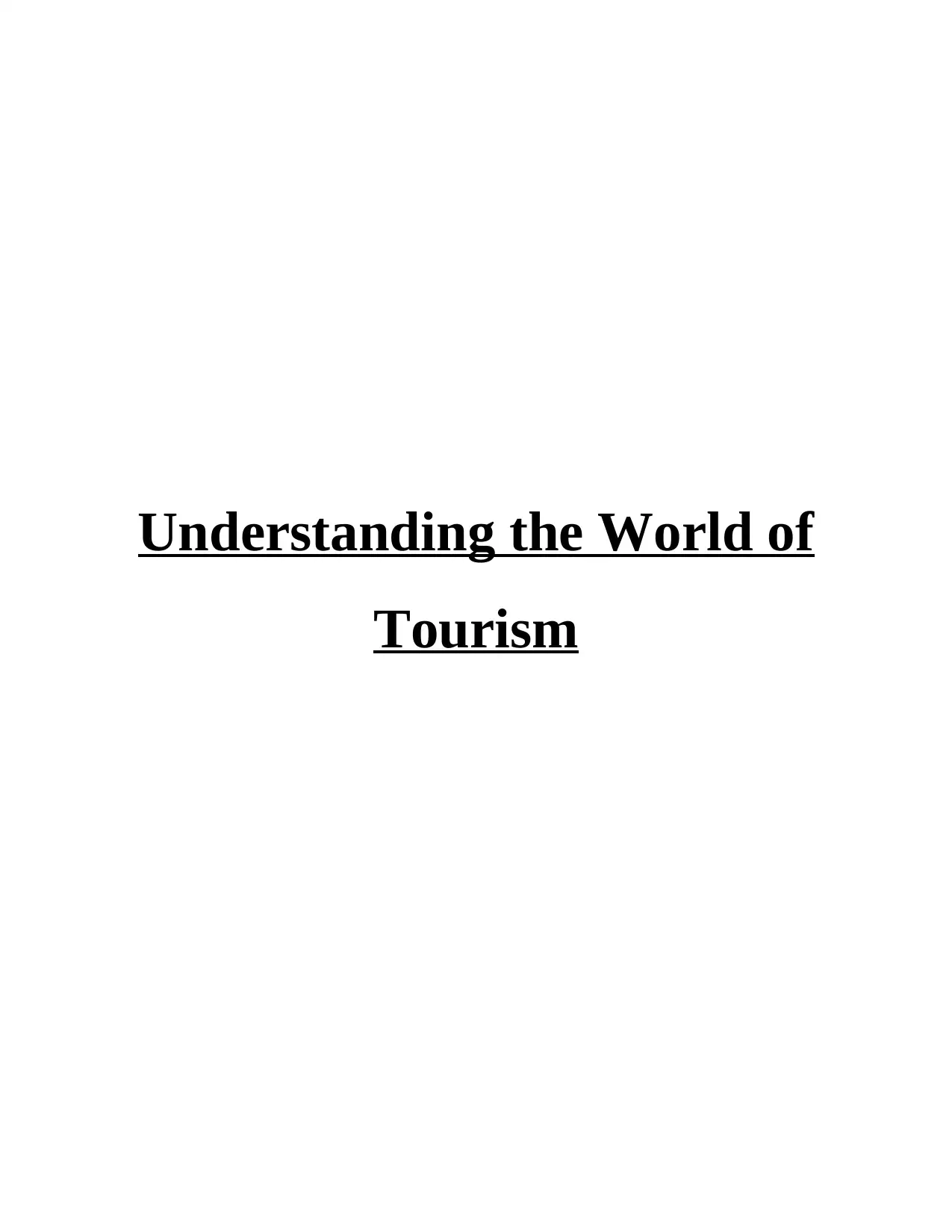
Understanding the World of
Tourism
Tourism
Paraphrase This Document
Need a fresh take? Get an instant paraphrase of this document with our AI Paraphraser

TABLE OF CONTENTS
REFERENCES................................................................................................................................7
REFERENCES................................................................................................................................7
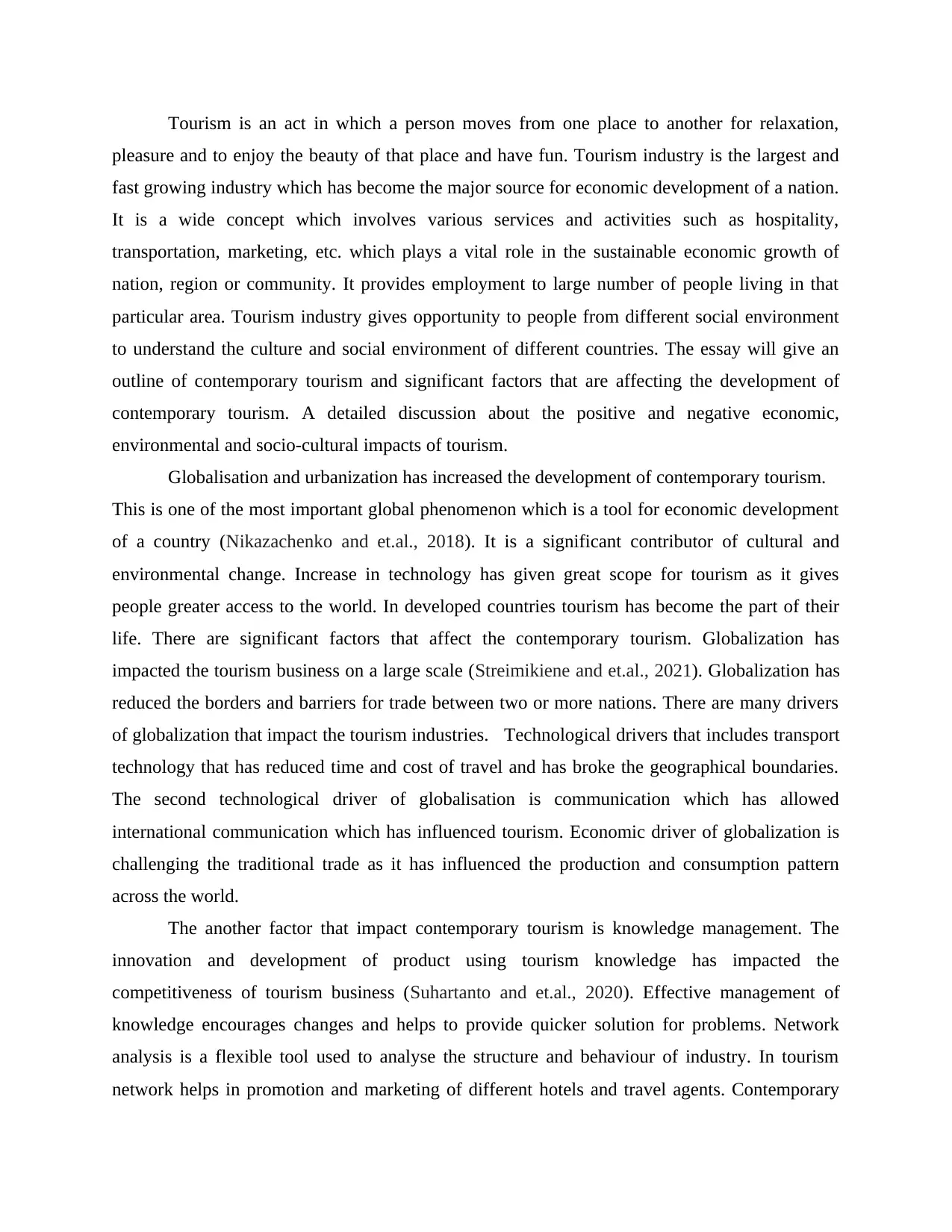
Tourism is an act in which a person moves from one place to another for relaxation,
pleasure and to enjoy the beauty of that place and have fun. Tourism industry is the largest and
fast growing industry which has become the major source for economic development of a nation.
It is a wide concept which involves various services and activities such as hospitality,
transportation, marketing, etc. which plays a vital role in the sustainable economic growth of
nation, region or community. It provides employment to large number of people living in that
particular area. Tourism industry gives opportunity to people from different social environment
to understand the culture and social environment of different countries. The essay will give an
outline of contemporary tourism and significant factors that are affecting the development of
contemporary tourism. A detailed discussion about the positive and negative economic,
environmental and socio-cultural impacts of tourism.
Globalisation and urbanization has increased the development of contemporary tourism.
This is one of the most important global phenomenon which is a tool for economic development
of a country (Nikazachenko and et.al., 2018). It is a significant contributor of cultural and
environmental change. Increase in technology has given great scope for tourism as it gives
people greater access to the world. In developed countries tourism has become the part of their
life. There are significant factors that affect the contemporary tourism. Globalization has
impacted the tourism business on a large scale (Streimikiene and et.al., 2021). Globalization has
reduced the borders and barriers for trade between two or more nations. There are many drivers
of globalization that impact the tourism industries. Technological drivers that includes transport
technology that has reduced time and cost of travel and has broke the geographical boundaries.
The second technological driver of globalisation is communication which has allowed
international communication which has influenced tourism. Economic driver of globalization is
challenging the traditional trade as it has influenced the production and consumption pattern
across the world.
The another factor that impact contemporary tourism is knowledge management. The
innovation and development of product using tourism knowledge has impacted the
competitiveness of tourism business (Suhartanto and et.al., 2020). Effective management of
knowledge encourages changes and helps to provide quicker solution for problems. Network
analysis is a flexible tool used to analyse the structure and behaviour of industry. In tourism
network helps in promotion and marketing of different hotels and travel agents. Contemporary
pleasure and to enjoy the beauty of that place and have fun. Tourism industry is the largest and
fast growing industry which has become the major source for economic development of a nation.
It is a wide concept which involves various services and activities such as hospitality,
transportation, marketing, etc. which plays a vital role in the sustainable economic growth of
nation, region or community. It provides employment to large number of people living in that
particular area. Tourism industry gives opportunity to people from different social environment
to understand the culture and social environment of different countries. The essay will give an
outline of contemporary tourism and significant factors that are affecting the development of
contemporary tourism. A detailed discussion about the positive and negative economic,
environmental and socio-cultural impacts of tourism.
Globalisation and urbanization has increased the development of contemporary tourism.
This is one of the most important global phenomenon which is a tool for economic development
of a country (Nikazachenko and et.al., 2018). It is a significant contributor of cultural and
environmental change. Increase in technology has given great scope for tourism as it gives
people greater access to the world. In developed countries tourism has become the part of their
life. There are significant factors that affect the contemporary tourism. Globalization has
impacted the tourism business on a large scale (Streimikiene and et.al., 2021). Globalization has
reduced the borders and barriers for trade between two or more nations. There are many drivers
of globalization that impact the tourism industries. Technological drivers that includes transport
technology that has reduced time and cost of travel and has broke the geographical boundaries.
The second technological driver of globalisation is communication which has allowed
international communication which has influenced tourism. Economic driver of globalization is
challenging the traditional trade as it has influenced the production and consumption pattern
across the world.
The another factor that impact contemporary tourism is knowledge management. The
innovation and development of product using tourism knowledge has impacted the
competitiveness of tourism business (Suhartanto and et.al., 2020). Effective management of
knowledge encourages changes and helps to provide quicker solution for problems. Network
analysis is a flexible tool used to analyse the structure and behaviour of industry. In tourism
network helps in promotion and marketing of different hotels and travel agents. Contemporary
⊘ This is a preview!⊘
Do you want full access?
Subscribe today to unlock all pages.

Trusted by 1+ million students worldwide
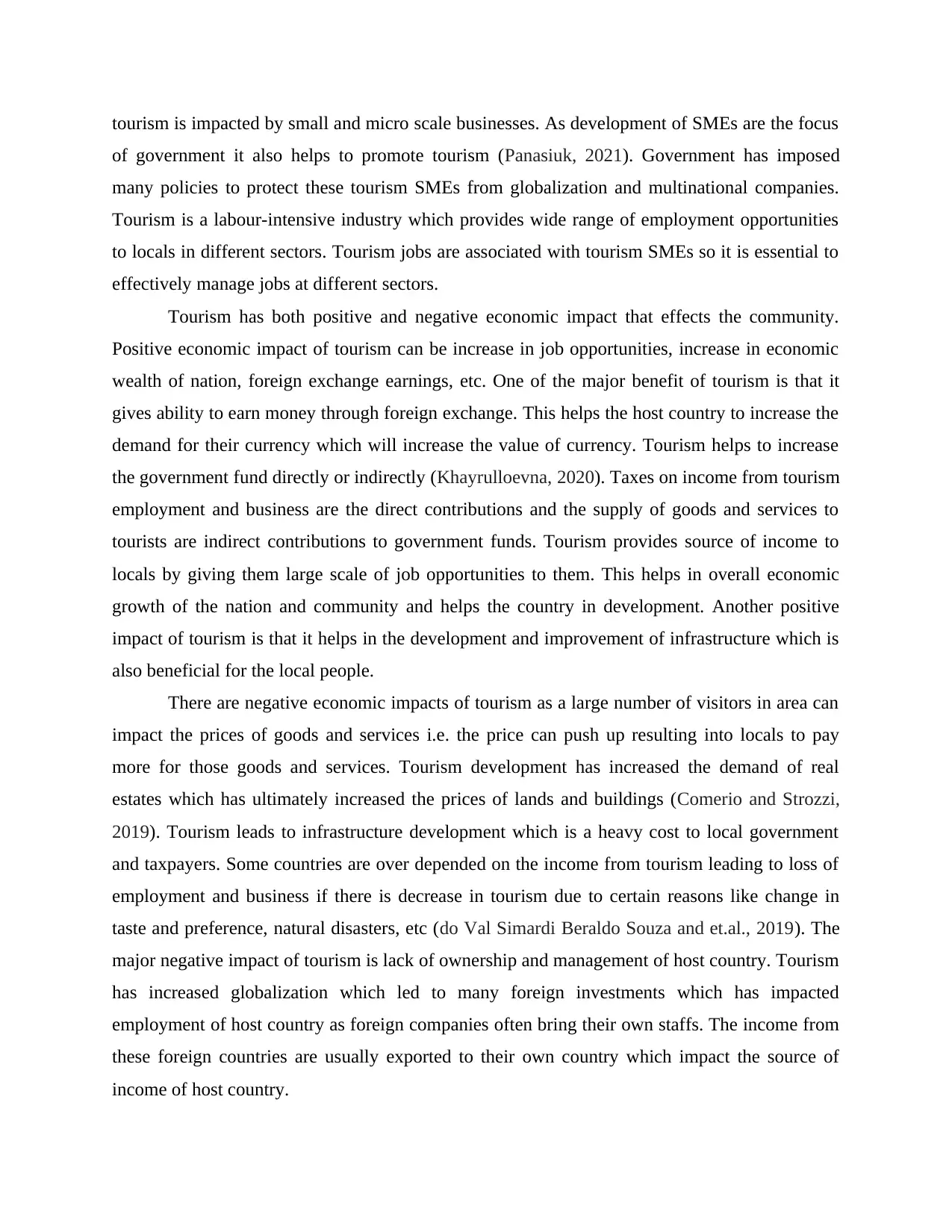
tourism is impacted by small and micro scale businesses. As development of SMEs are the focus
of government it also helps to promote tourism (Panasiuk, 2021). Government has imposed
many policies to protect these tourism SMEs from globalization and multinational companies.
Tourism is a labour-intensive industry which provides wide range of employment opportunities
to locals in different sectors. Tourism jobs are associated with tourism SMEs so it is essential to
effectively manage jobs at different sectors.
Tourism has both positive and negative economic impact that effects the community.
Positive economic impact of tourism can be increase in job opportunities, increase in economic
wealth of nation, foreign exchange earnings, etc. One of the major benefit of tourism is that it
gives ability to earn money through foreign exchange. This helps the host country to increase the
demand for their currency which will increase the value of currency. Tourism helps to increase
the government fund directly or indirectly (Khayrulloevna, 2020). Taxes on income from tourism
employment and business are the direct contributions and the supply of goods and services to
tourists are indirect contributions to government funds. Tourism provides source of income to
locals by giving them large scale of job opportunities to them. This helps in overall economic
growth of the nation and community and helps the country in development. Another positive
impact of tourism is that it helps in the development and improvement of infrastructure which is
also beneficial for the local people.
There are negative economic impacts of tourism as a large number of visitors in area can
impact the prices of goods and services i.e. the price can push up resulting into locals to pay
more for those goods and services. Tourism development has increased the demand of real
estates which has ultimately increased the prices of lands and buildings (Comerio and Strozzi,
2019). Tourism leads to infrastructure development which is a heavy cost to local government
and taxpayers. Some countries are over depended on the income from tourism leading to loss of
employment and business if there is decrease in tourism due to certain reasons like change in
taste and preference, natural disasters, etc (do Val Simardi Beraldo Souza and et.al., 2019). The
major negative impact of tourism is lack of ownership and management of host country. Tourism
has increased globalization which led to many foreign investments which has impacted
employment of host country as foreign companies often bring their own staffs. The income from
these foreign countries are usually exported to their own country which impact the source of
income of host country.
of government it also helps to promote tourism (Panasiuk, 2021). Government has imposed
many policies to protect these tourism SMEs from globalization and multinational companies.
Tourism is a labour-intensive industry which provides wide range of employment opportunities
to locals in different sectors. Tourism jobs are associated with tourism SMEs so it is essential to
effectively manage jobs at different sectors.
Tourism has both positive and negative economic impact that effects the community.
Positive economic impact of tourism can be increase in job opportunities, increase in economic
wealth of nation, foreign exchange earnings, etc. One of the major benefit of tourism is that it
gives ability to earn money through foreign exchange. This helps the host country to increase the
demand for their currency which will increase the value of currency. Tourism helps to increase
the government fund directly or indirectly (Khayrulloevna, 2020). Taxes on income from tourism
employment and business are the direct contributions and the supply of goods and services to
tourists are indirect contributions to government funds. Tourism provides source of income to
locals by giving them large scale of job opportunities to them. This helps in overall economic
growth of the nation and community and helps the country in development. Another positive
impact of tourism is that it helps in the development and improvement of infrastructure which is
also beneficial for the local people.
There are negative economic impacts of tourism as a large number of visitors in area can
impact the prices of goods and services i.e. the price can push up resulting into locals to pay
more for those goods and services. Tourism development has increased the demand of real
estates which has ultimately increased the prices of lands and buildings (Comerio and Strozzi,
2019). Tourism leads to infrastructure development which is a heavy cost to local government
and taxpayers. Some countries are over depended on the income from tourism leading to loss of
employment and business if there is decrease in tourism due to certain reasons like change in
taste and preference, natural disasters, etc (do Val Simardi Beraldo Souza and et.al., 2019). The
major negative impact of tourism is lack of ownership and management of host country. Tourism
has increased globalization which led to many foreign investments which has impacted
employment of host country as foreign companies often bring their own staffs. The income from
these foreign countries are usually exported to their own country which impact the source of
income of host country.
Paraphrase This Document
Need a fresh take? Get an instant paraphrase of this document with our AI Paraphraser
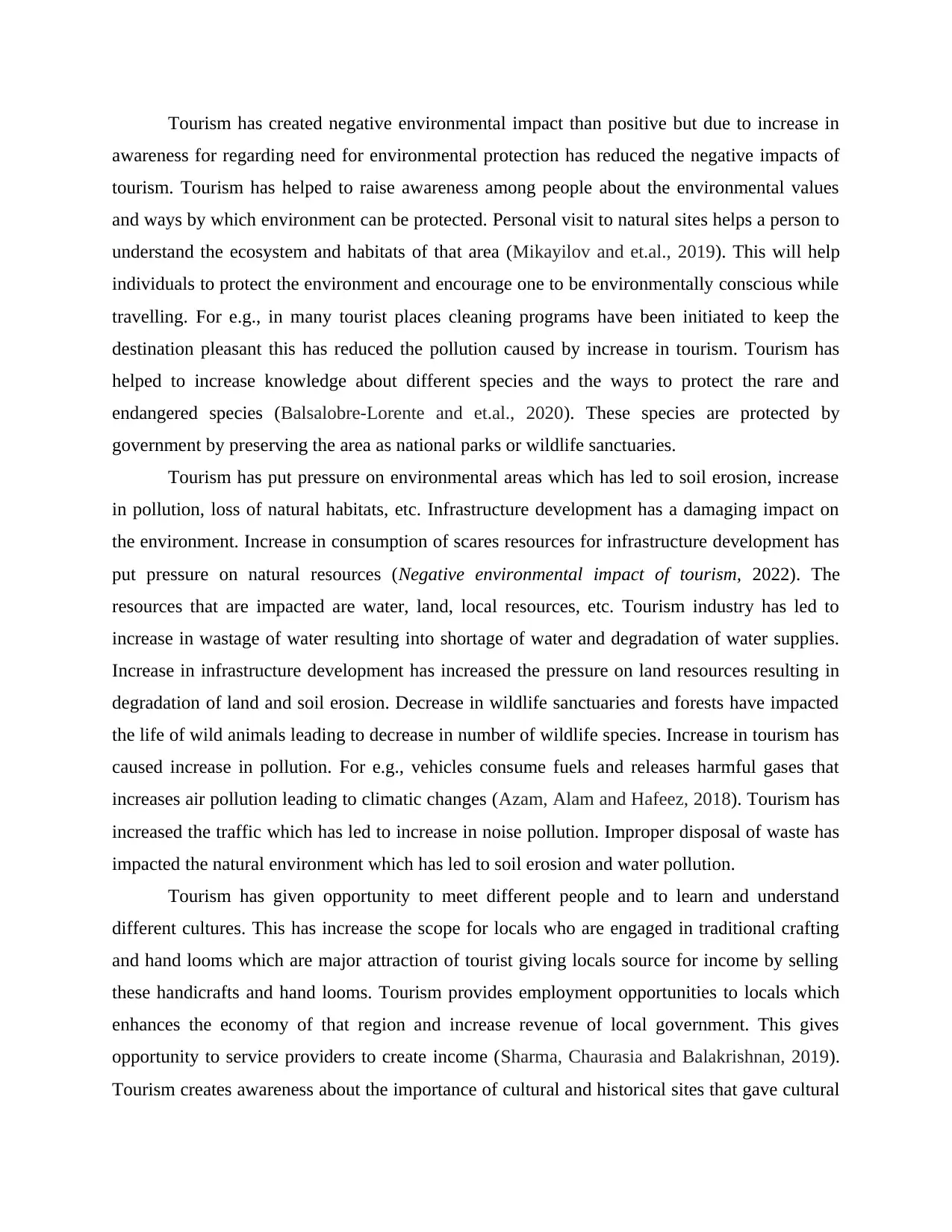
Tourism has created negative environmental impact than positive but due to increase in
awareness for regarding need for environmental protection has reduced the negative impacts of
tourism. Tourism has helped to raise awareness among people about the environmental values
and ways by which environment can be protected. Personal visit to natural sites helps a person to
understand the ecosystem and habitats of that area (Mikayilov and et.al., 2019). This will help
individuals to protect the environment and encourage one to be environmentally conscious while
travelling. For e.g., in many tourist places cleaning programs have been initiated to keep the
destination pleasant this has reduced the pollution caused by increase in tourism. Tourism has
helped to increase knowledge about different species and the ways to protect the rare and
endangered species (Balsalobre-Lorente and et.al., 2020). These species are protected by
government by preserving the area as national parks or wildlife sanctuaries.
Tourism has put pressure on environmental areas which has led to soil erosion, increase
in pollution, loss of natural habitats, etc. Infrastructure development has a damaging impact on
the environment. Increase in consumption of scares resources for infrastructure development has
put pressure on natural resources (Negative environmental impact of tourism, 2022). The
resources that are impacted are water, land, local resources, etc. Tourism industry has led to
increase in wastage of water resulting into shortage of water and degradation of water supplies.
Increase in infrastructure development has increased the pressure on land resources resulting in
degradation of land and soil erosion. Decrease in wildlife sanctuaries and forests have impacted
the life of wild animals leading to decrease in number of wildlife species. Increase in tourism has
caused increase in pollution. For e.g., vehicles consume fuels and releases harmful gases that
increases air pollution leading to climatic changes (Azam, Alam and Hafeez, 2018). Tourism has
increased the traffic which has led to increase in noise pollution. Improper disposal of waste has
impacted the natural environment which has led to soil erosion and water pollution.
Tourism has given opportunity to meet different people and to learn and understand
different cultures. This has increase the scope for locals who are engaged in traditional crafting
and hand looms which are major attraction of tourist giving locals source for income by selling
these handicrafts and hand looms. Tourism provides employment opportunities to locals which
enhances the economy of that region and increase revenue of local government. This gives
opportunity to service providers to create income (Sharma, Chaurasia and Balakrishnan, 2019).
Tourism creates awareness about the importance of cultural and historical sites that gave cultural
awareness for regarding need for environmental protection has reduced the negative impacts of
tourism. Tourism has helped to raise awareness among people about the environmental values
and ways by which environment can be protected. Personal visit to natural sites helps a person to
understand the ecosystem and habitats of that area (Mikayilov and et.al., 2019). This will help
individuals to protect the environment and encourage one to be environmentally conscious while
travelling. For e.g., in many tourist places cleaning programs have been initiated to keep the
destination pleasant this has reduced the pollution caused by increase in tourism. Tourism has
helped to increase knowledge about different species and the ways to protect the rare and
endangered species (Balsalobre-Lorente and et.al., 2020). These species are protected by
government by preserving the area as national parks or wildlife sanctuaries.
Tourism has put pressure on environmental areas which has led to soil erosion, increase
in pollution, loss of natural habitats, etc. Infrastructure development has a damaging impact on
the environment. Increase in consumption of scares resources for infrastructure development has
put pressure on natural resources (Negative environmental impact of tourism, 2022). The
resources that are impacted are water, land, local resources, etc. Tourism industry has led to
increase in wastage of water resulting into shortage of water and degradation of water supplies.
Increase in infrastructure development has increased the pressure on land resources resulting in
degradation of land and soil erosion. Decrease in wildlife sanctuaries and forests have impacted
the life of wild animals leading to decrease in number of wildlife species. Increase in tourism has
caused increase in pollution. For e.g., vehicles consume fuels and releases harmful gases that
increases air pollution leading to climatic changes (Azam, Alam and Hafeez, 2018). Tourism has
increased the traffic which has led to increase in noise pollution. Improper disposal of waste has
impacted the natural environment which has led to soil erosion and water pollution.
Tourism has given opportunity to meet different people and to learn and understand
different cultures. This has increase the scope for locals who are engaged in traditional crafting
and hand looms which are major attraction of tourist giving locals source for income by selling
these handicrafts and hand looms. Tourism provides employment opportunities to locals which
enhances the economy of that region and increase revenue of local government. This gives
opportunity to service providers to create income (Sharma, Chaurasia and Balakrishnan, 2019).
Tourism creates awareness about the importance of cultural and historical sites that gave cultural
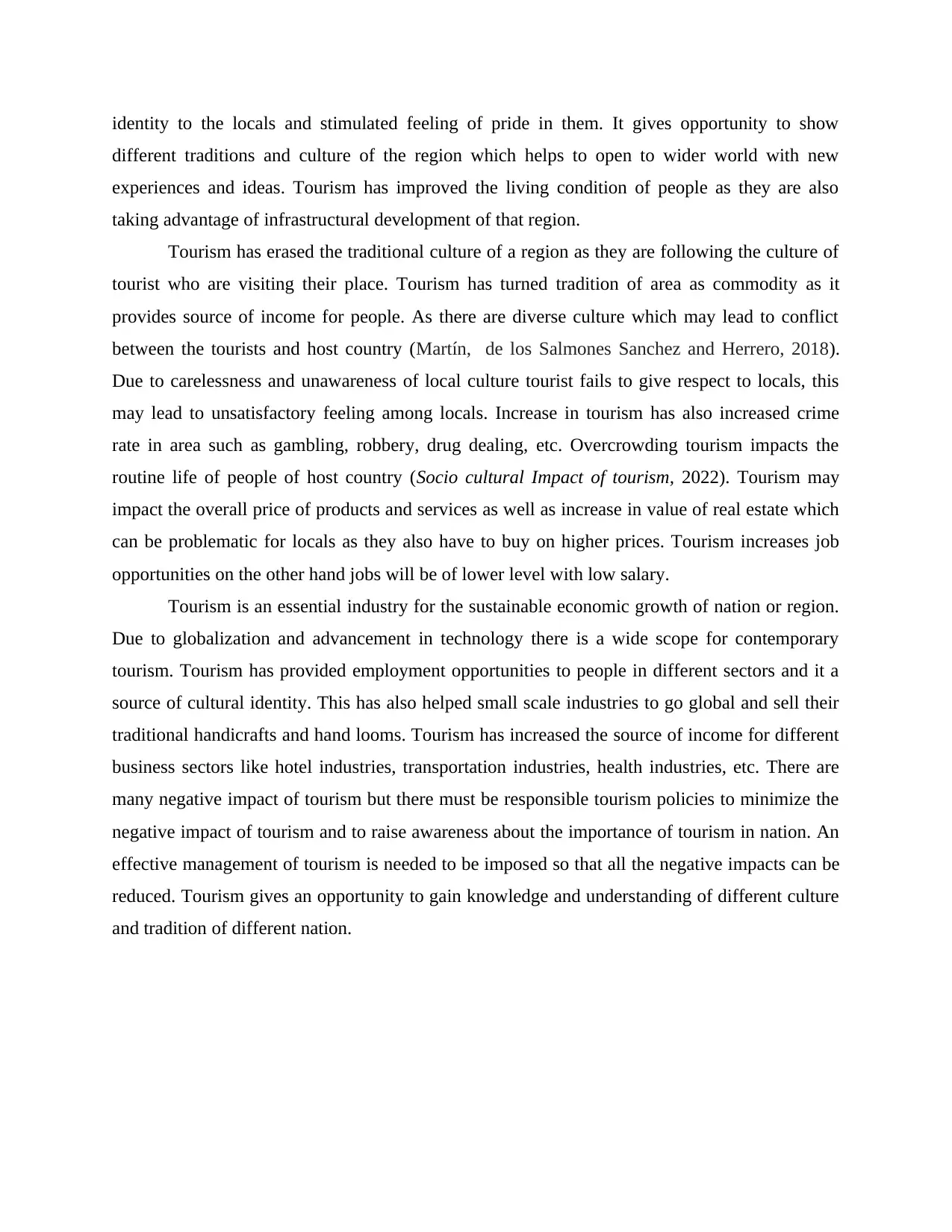
identity to the locals and stimulated feeling of pride in them. It gives opportunity to show
different traditions and culture of the region which helps to open to wider world with new
experiences and ideas. Tourism has improved the living condition of people as they are also
taking advantage of infrastructural development of that region.
Tourism has erased the traditional culture of a region as they are following the culture of
tourist who are visiting their place. Tourism has turned tradition of area as commodity as it
provides source of income for people. As there are diverse culture which may lead to conflict
between the tourists and host country (Martín, de los Salmones Sanchez and Herrero, 2018).
Due to carelessness and unawareness of local culture tourist fails to give respect to locals, this
may lead to unsatisfactory feeling among locals. Increase in tourism has also increased crime
rate in area such as gambling, robbery, drug dealing, etc. Overcrowding tourism impacts the
routine life of people of host country (Socio cultural Impact of tourism, 2022). Tourism may
impact the overall price of products and services as well as increase in value of real estate which
can be problematic for locals as they also have to buy on higher prices. Tourism increases job
opportunities on the other hand jobs will be of lower level with low salary.
Tourism is an essential industry for the sustainable economic growth of nation or region.
Due to globalization and advancement in technology there is a wide scope for contemporary
tourism. Tourism has provided employment opportunities to people in different sectors and it a
source of cultural identity. This has also helped small scale industries to go global and sell their
traditional handicrafts and hand looms. Tourism has increased the source of income for different
business sectors like hotel industries, transportation industries, health industries, etc. There are
many negative impact of tourism but there must be responsible tourism policies to minimize the
negative impact of tourism and to raise awareness about the importance of tourism in nation. An
effective management of tourism is needed to be imposed so that all the negative impacts can be
reduced. Tourism gives an opportunity to gain knowledge and understanding of different culture
and tradition of different nation.
different traditions and culture of the region which helps to open to wider world with new
experiences and ideas. Tourism has improved the living condition of people as they are also
taking advantage of infrastructural development of that region.
Tourism has erased the traditional culture of a region as they are following the culture of
tourist who are visiting their place. Tourism has turned tradition of area as commodity as it
provides source of income for people. As there are diverse culture which may lead to conflict
between the tourists and host country (Martín, de los Salmones Sanchez and Herrero, 2018).
Due to carelessness and unawareness of local culture tourist fails to give respect to locals, this
may lead to unsatisfactory feeling among locals. Increase in tourism has also increased crime
rate in area such as gambling, robbery, drug dealing, etc. Overcrowding tourism impacts the
routine life of people of host country (Socio cultural Impact of tourism, 2022). Tourism may
impact the overall price of products and services as well as increase in value of real estate which
can be problematic for locals as they also have to buy on higher prices. Tourism increases job
opportunities on the other hand jobs will be of lower level with low salary.
Tourism is an essential industry for the sustainable economic growth of nation or region.
Due to globalization and advancement in technology there is a wide scope for contemporary
tourism. Tourism has provided employment opportunities to people in different sectors and it a
source of cultural identity. This has also helped small scale industries to go global and sell their
traditional handicrafts and hand looms. Tourism has increased the source of income for different
business sectors like hotel industries, transportation industries, health industries, etc. There are
many negative impact of tourism but there must be responsible tourism policies to minimize the
negative impact of tourism and to raise awareness about the importance of tourism in nation. An
effective management of tourism is needed to be imposed so that all the negative impacts can be
reduced. Tourism gives an opportunity to gain knowledge and understanding of different culture
and tradition of different nation.
⊘ This is a preview!⊘
Do you want full access?
Subscribe today to unlock all pages.

Trusted by 1+ million students worldwide
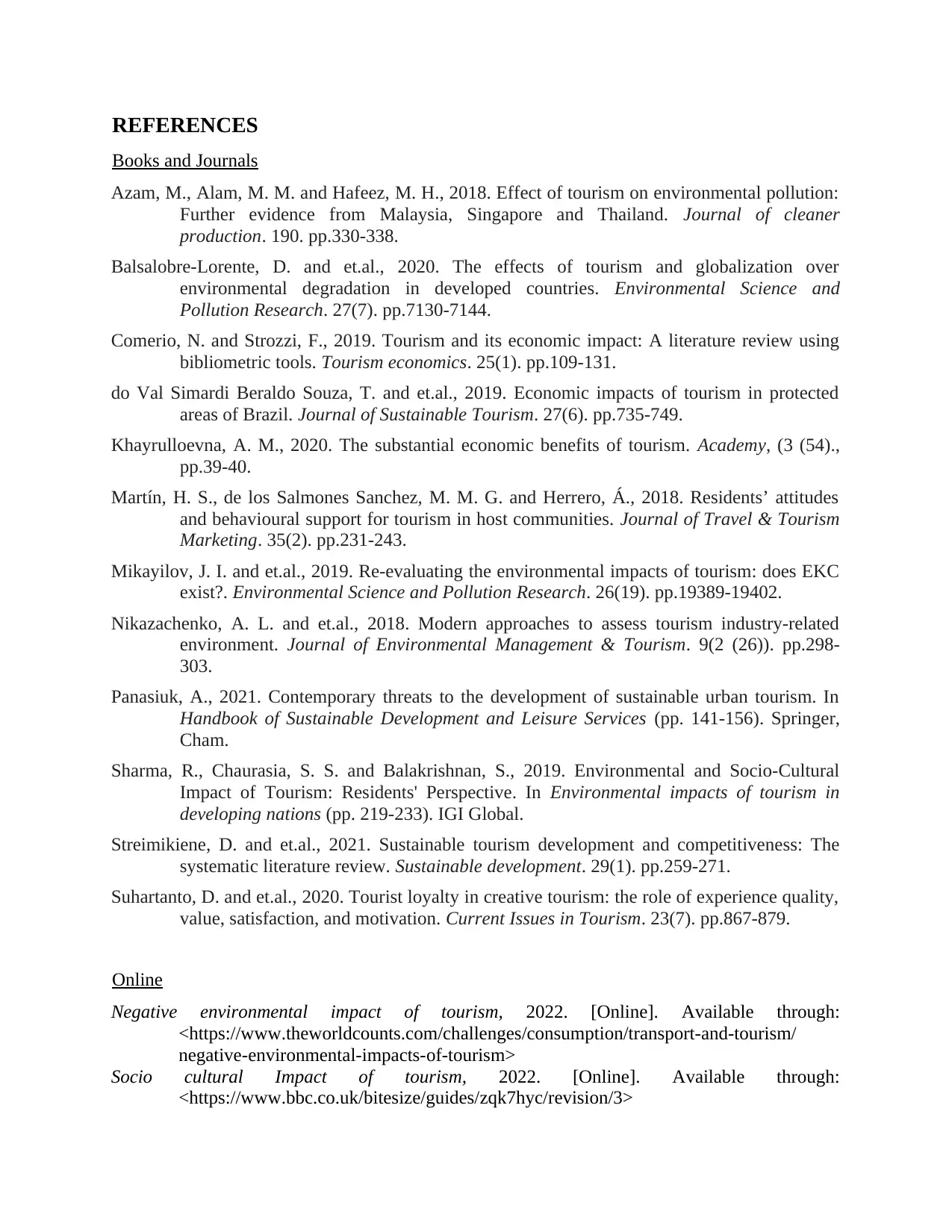
REFERENCES
Books and Journals
Azam, M., Alam, M. M. and Hafeez, M. H., 2018. Effect of tourism on environmental pollution:
Further evidence from Malaysia, Singapore and Thailand. Journal of cleaner
production. 190. pp.330-338.
Balsalobre-Lorente, D. and et.al., 2020. The effects of tourism and globalization over
environmental degradation in developed countries. Environmental Science and
Pollution Research. 27(7). pp.7130-7144.
Comerio, N. and Strozzi, F., 2019. Tourism and its economic impact: A literature review using
bibliometric tools. Tourism economics. 25(1). pp.109-131.
do Val Simardi Beraldo Souza, T. and et.al., 2019. Economic impacts of tourism in protected
areas of Brazil. Journal of Sustainable Tourism. 27(6). pp.735-749.
Khayrulloevna, A. M., 2020. The substantial economic benefits of tourism. Academy, (3 (54).,
pp.39-40.
Martín, H. S., de los Salmones Sanchez, M. M. G. and Herrero, Á., 2018. Residentsʼ attitudes
and behavioural support for tourism in host communities. Journal of Travel & Tourism
Marketing. 35(2). pp.231-243.
Mikayilov, J. I. and et.al., 2019. Re-evaluating the environmental impacts of tourism: does EKC
exist?. Environmental Science and Pollution Research. 26(19). pp.19389-19402.
Nikazachenko, A. L. and et.al., 2018. Modern approaches to assess tourism industry-related
environment. Journal of Environmental Management & Tourism. 9(2 (26)). pp.298-
303.
Panasiuk, A., 2021. Contemporary threats to the development of sustainable urban tourism. In
Handbook of Sustainable Development and Leisure Services (pp. 141-156). Springer,
Cham.
Sharma, R., Chaurasia, S. S. and Balakrishnan, S., 2019. Environmental and Socio-Cultural
Impact of Tourism: Residents' Perspective. In Environmental impacts of tourism in
developing nations (pp. 219-233). IGI Global.
Streimikiene, D. and et.al., 2021. Sustainable tourism development and competitiveness: The
systematic literature review. Sustainable development. 29(1). pp.259-271.
Suhartanto, D. and et.al., 2020. Tourist loyalty in creative tourism: the role of experience quality,
value, satisfaction, and motivation. Current Issues in Tourism. 23(7). pp.867-879.
Online
Negative environmental impact of tourism, 2022. [Online]. Available through:
<https://www.theworldcounts.com/challenges/consumption/transport-and-tourism/
negative-environmental-impacts-of-tourism>
Socio cultural Impact of tourism, 2022. [Online]. Available through:
<https://www.bbc.co.uk/bitesize/guides/zqk7hyc/revision/3>
Books and Journals
Azam, M., Alam, M. M. and Hafeez, M. H., 2018. Effect of tourism on environmental pollution:
Further evidence from Malaysia, Singapore and Thailand. Journal of cleaner
production. 190. pp.330-338.
Balsalobre-Lorente, D. and et.al., 2020. The effects of tourism and globalization over
environmental degradation in developed countries. Environmental Science and
Pollution Research. 27(7). pp.7130-7144.
Comerio, N. and Strozzi, F., 2019. Tourism and its economic impact: A literature review using
bibliometric tools. Tourism economics. 25(1). pp.109-131.
do Val Simardi Beraldo Souza, T. and et.al., 2019. Economic impacts of tourism in protected
areas of Brazil. Journal of Sustainable Tourism. 27(6). pp.735-749.
Khayrulloevna, A. M., 2020. The substantial economic benefits of tourism. Academy, (3 (54).,
pp.39-40.
Martín, H. S., de los Salmones Sanchez, M. M. G. and Herrero, Á., 2018. Residentsʼ attitudes
and behavioural support for tourism in host communities. Journal of Travel & Tourism
Marketing. 35(2). pp.231-243.
Mikayilov, J. I. and et.al., 2019. Re-evaluating the environmental impacts of tourism: does EKC
exist?. Environmental Science and Pollution Research. 26(19). pp.19389-19402.
Nikazachenko, A. L. and et.al., 2018. Modern approaches to assess tourism industry-related
environment. Journal of Environmental Management & Tourism. 9(2 (26)). pp.298-
303.
Panasiuk, A., 2021. Contemporary threats to the development of sustainable urban tourism. In
Handbook of Sustainable Development and Leisure Services (pp. 141-156). Springer,
Cham.
Sharma, R., Chaurasia, S. S. and Balakrishnan, S., 2019. Environmental and Socio-Cultural
Impact of Tourism: Residents' Perspective. In Environmental impacts of tourism in
developing nations (pp. 219-233). IGI Global.
Streimikiene, D. and et.al., 2021. Sustainable tourism development and competitiveness: The
systematic literature review. Sustainable development. 29(1). pp.259-271.
Suhartanto, D. and et.al., 2020. Tourist loyalty in creative tourism: the role of experience quality,
value, satisfaction, and motivation. Current Issues in Tourism. 23(7). pp.867-879.
Online
Negative environmental impact of tourism, 2022. [Online]. Available through:
<https://www.theworldcounts.com/challenges/consumption/transport-and-tourism/
negative-environmental-impacts-of-tourism>
Socio cultural Impact of tourism, 2022. [Online]. Available through:
<https://www.bbc.co.uk/bitesize/guides/zqk7hyc/revision/3>
1 out of 7
Related Documents
Your All-in-One AI-Powered Toolkit for Academic Success.
+13062052269
info@desklib.com
Available 24*7 on WhatsApp / Email
![[object Object]](/_next/static/media/star-bottom.7253800d.svg)
Unlock your academic potential
© 2024 | Zucol Services PVT LTD | All rights reserved.


